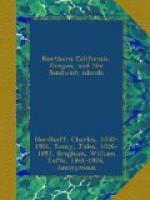Umi, who was of a proud and independent character, foreseeing, no doubt, even then, the wicked conduct of his brother, would not submit to him, and refused to appear in his presence. Giving up his share of power, he departed from Waipio with his two aikane, and retired into the mountains, where he gave himself up to bird-catching.
Hakau then reigned alone, and ruled according to his fancy. Abusing his authority, he made himself feared, but, at the same time, detested by his people. He brought upon himself the censure of the chief attendants of his father, whom he provoked by all sorts of humiliations and insults. If he saw any one of either sex remarkable for good looks, he had them tattooed in a frightful manner for his good pleasure.
Meanwhile Umi, who had a taste for savage life, had taken leave of his favorites, and wandered alone in the midst of the forests and mountains. One day, when he descended to the shore at Laupahoehoe, in the district of Hilo, he fell in love with a woman of the people, and made her his companion without arousing a suspicion of his high birth. Devoting himself, then, to field labor, he was seen sometimes cultivating the ground, and sometimes going down to the sea to fish.
By generous offerings, he knew how to skillfully flatter an old man named Kaleihokuu, an influential priest, who at last adopted him as one of his children. Umi always kept at the head of the farmers and fishermen, and a considerable number, recognizing his physical superiority, voluntarily enrolled themselves under his orders and those of his foster-father; he was only known by the name of Hanai (foster-child) of Kaleihokuu. Meditating probably, even then, a way of acquiring supreme power, Umi exerted himself to gain the sympathies of the people, in whose labors he took an incredible part. There are seen to this day, above Laupahoehoe, the fields which Umi cultivated, and near the sea can be seen the heiau, or temple, in which Kaleihokuu offered sacrifices to the gods.
Hakau continued to reign, always without showing the least respect to the old officers of Liloa, his father. Two old men, high chiefs by birth, and highly honored under the preceding reign, had persisted in residing near the palace at Waipio, in spite of the insults to which the nearness of the court exposed them. One day when they were hungry, after a long scarcity of food, they said to one of their attendants: “Go to the palace of Hakau. Tell his Majesty that the two old chiefs are hungry, and demand of him, in our name, food, fish, and awa."[14] The attendant went at once to the king to fulfill his mission. Hakau replied with foul and insulting terms: “Go tell the two old men that they shall have neither food, fish, nor awa!” The two chiefs, on hearing this cruel reply, commenced to deplore their lot, and regret more bitterly than ever the time they lived under Liloa. Then rousing themselves, they said to their attendant,




